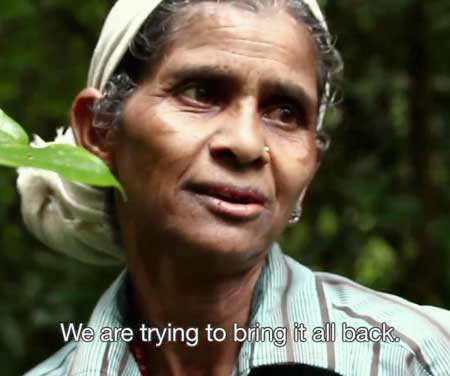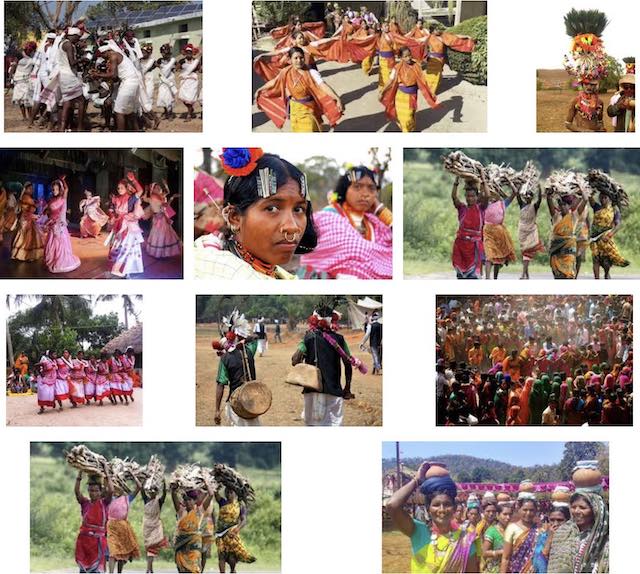
Director: Sunanda Bhat | Producer: Songline Films
Genre: Documentary | Produced In: 2012 | Story Teller’s Country: India
Synopsis: The film interweaves contemporary narratives with an ancient tribal creation myth to explore the effects of a rapidly changing landscape on lives and livelihoods.
A woman’s concern over the disappearance of medicinal plants from the forest, a farmer’s commitment to grow traditional varieties of rice organically and a cash crop cultivator’s struggle to survive amidst farmers’ suicides, offer fresh insights into shifting relations between people, knowledge systems and environment.
As hills flatten, forests disappear and traditional knowledge systems are forgotten, the film reminds us that this diversity could disappear forever, to be replaced by monotonous and unsustainable alternatives.
Request DVD: You may purchase the DVD of this film directly from this StoryTeller/Producer. Please visit.
Source: Have You Seen The Arana? | Watch Documentaries Online | Promote Documentary Film
Address : http://www.cultureunplugged.com/documentary/watch-online/play/50120/Have-You-Seen-The-Arana-
Date Visited: Thu Mar 06 2014 11:35:51 GMT+0100 (CET)
“The natural wealth with which much of tribal India is endowed is also its bane. […] The Adivasi is wedged between the state programme for development, meaning mines, dams, steel plants and roads, and a private agenda for quick money, which is currently termed ‘real estate’.” – Madhu Ramnath, Preface for Woodsmoke and Leafcups >>
Up-to-date reports by Indian experts and journalists
Search tips
Combine the name of any particular state, language or region with that of any tribal (Adivasi) community.
Add keywords of special interest (music, poetry, dance just as health, sacred grove and biodiversity); learn about the rights of Scheduled Tribes such as the “Forest Rights Act” (FRA); and the United Nations “Declaration on the Rights of Indigenous Peoples”, “Universal Declaration of Human Rights”, “women’s rights”, or “children’s right to education”.
Ask a question that includes “tribal” or “Adivasi”, for instance: “Adivasi way of life better?” (or “tribal way of life worse?”)
Specify any particular issue or news item (biodiversity, bonded labour and human trafficking, climate change, ecology, economic development, ethnobotany, ethnomedicine, global warming, hunter-gatherers in a particular region or state, prevention of rural poverty, water access).
For official figures include “scheduled tribe ST” along with a union state or region: e.g. “Chhattisgarh ST community”, “Himalayan tribe”, “Scheduled tribe Tamil Nadu census”, “ST Kerala census”, “Particularly Vulnerable Tribal Group Jharkhand”, “PVTG Rajasthan”, “Adivasi ST Kerala”, “Adibasi ST West Bengal” etc.
In case the Google Custom Search window is not displayed here try the following: (1) toggle between “Reader” and regular viewing; (2) in your browser’s Security settings select “Enable JavaScript” | More tips >>
Note: hyperlinks and quotes are meant for fact-checking and information purposes only | Disclaimer >>
List of websites covered by this Google custom search engine
Academia.edu (platform for academics to share research papers) – www.academia.edu
Archive.org – https://archive.org
Centre for Science and Environment – https://www.cseindia.org
Current Conservation – https://www.currentconservation.org
Development and Cooperation (D+C) https://www.dandc.eu
Down To Earth (India) – www.downtoearth.org.in
India Environment Portal – www.indiaenvironmentportal.org.in
Harnessing Nature Magazine – https://harnessingnature.online
Mongabay-India – https://india.mongabay.com
M S Swaminathan Research Foundation – www.mssrf.org
Navdanya (protecting India’s biodiversity based food heritage) – https://navdanya.org
Third World Network (Penang, Malaysia) – https://twn.my
The Shola Trust (nature conservation in the Nilgiri region) – www.thesholatrust.org

Indian online periodicals and platforms | Images view >>
~ ~ ~
Personalize your CustomSearch by combining other search words >>
(e.g. name of a tribal community and region, a craft, or dance and puppetry)
Research the above issues with the help of Shodhganga: A reservoir of theses from universities all over India, made available under Open Access >>
Note: hyperlinks and quotes are meant for fact-checking and information purposes only | Disclaimer >>
Related posts